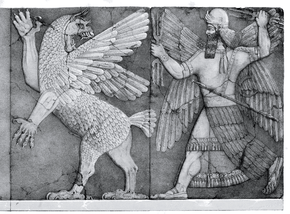Igigi
Igigi are the gods of heaven in the mythology of Mesopotamia. Though sometimes synonymous with the term "Anunnaki", in one myth the Igigi were the younger gods who were servants of the Annunaki, until they rebelled and were replaced by the creation of humans.[1]
| Part of a series on |
| Ancient Mesopotamian religion |
|---|
 Chaos Monster and Sun God |
|
Seven gods who decree
|
|
Other major deities |
|
Demigods and heroes
|
| Related topics |
Etymology
The name has unknown origin. The signs for the names, and one of the options for the etymology of the igigi are i2-gi3-gi3, which are the same signs for 5-1-1 or 5-60-60 5*(60+60)=600 which are by some traditions All the gods.[2] another option is to try to interpret the words themselves. Igi means (eye) in the Sumerian language, and it used as logogram in the Akkadian language, gi stands for (penetrate sexually).[3] Therefore, Igigi could be translated to (Eyes in the sky, the watchers, who deflower).[4]
Atrahasis
Akkadian Paradise is described as a garden in the myth of Atrahasis where lower rank deities (the Igigi) are put to work digging a watercourse by the more senior deities (the Anunnaki).[5]
When the gods, man-like,
Bore the labour, carried the load,
The gods' load was great,
The toil grievous, the trouble excessive.
The great Anunnaku, the Seven,Were making the Igigu undertake the toil.[6]
The Igigi then rebel against the dictatorship of Enlil, setting fire to their tools and surrounding Enlil's great house by night. On hearing that toil on the irrigation channel is the reason for the disquiet, the Anunnaki council decide to create man to carry out agricultural labour.[6]
References
- Leick, Gwendolyn: A Dictionary of Ancient Near Eastern Mythology (NY: Routledge, 1998), p. 85
- "igigi in §4". Archived from the original on 2016-03-05. Retrieved 2016-03-05.
- The Pennsylvania Sumerian Dictionary
- Strassman, Rick; Wojtowicz, Slawek; Luna, Luis Eduardo; Frecska, Ede (2008). Inner Paths to Outer Space: Journeys to Alien Worlds through Psychedelics and Other Spiritual Technologies. Inner Traditions / Bear & Co. p. 239. ISBN 1594779996.
- William P. Brown (June 1999). The ethos of the cosmos: the genesis of moral imagination in the Bible. Wm. B. Eerdmans Publishing. pp. 140–. ISBN 978-0-8028-4539-9. Retrieved 17 June 2011.
- Millard, A.R., New Babylonian 'Genesis' Story, p. 8, The Tyndale Biblical Archaeology Lecture, 1966; Tyndale Bulletin 18, 3-18, 1967.